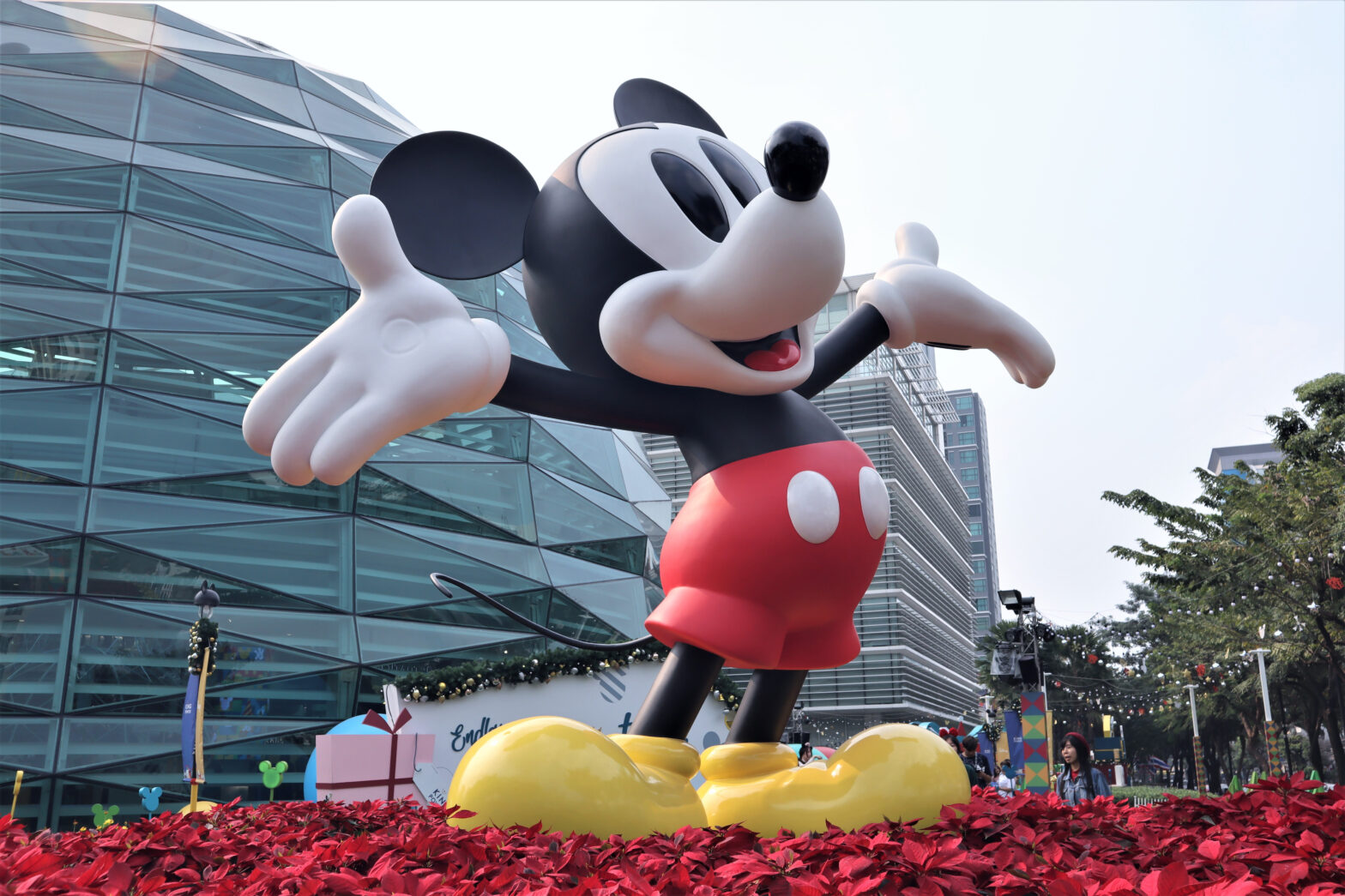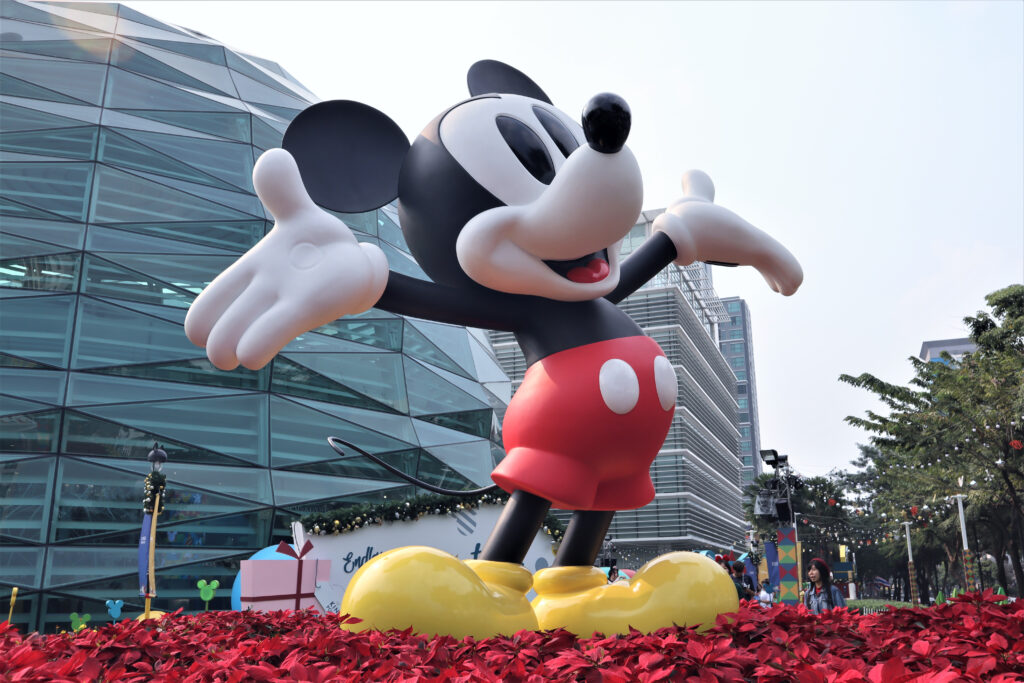The copyright for the animated short film entitled “Steamboat Willie“, published 1928, is set to expire at the end of 2023. This film is the first of nearly 95 years worth of Mickey Mouse films.
Is Mickey Mouse in the public domain, once this copyright expires? The quick answer is “no”.
To understand why, it’s important to understand what a “brand” is and the various intellectual property components that goes into that brand. Also, it’s important to remember that the animated short film entitled “Steamboat Willie” is falling into the public domain, but not all its “constituent elements,” such as the character otherwise known as Mickey Mouse.
What is a Brand — Disney will Never Allow Mickey Mouse in the Public Domain
A “brand” represents all those things, tangible and intangible, that creates an impression in the mind of the public related to product or service for which the brand is attached.
Consider what “pops into your head”, when you think of the following:
- Amazon.com
- FedEx
- McDonalds
- Apple
What “popped into your head” could be quite complex:
- Amazon.com – Online store? Comprehensive? Quick delivery? Inexpensive delivery? The “Amazon Smile” logo? Price match guarantee?
- FedEx – Shipping? Dependable? Tracking? Fast? Overnight?
- McDonalds – Friendly? Everywhere? Convenient? Tasty food?
- Apple – Sleek computers? Expensive? iPhones? An apple with a bite taken out of it?
The impressions you have of these brands, are carefully created, curated, managed, and enforced by their respective owners, using a variety of creative and legal mechanisms. The legal components of a brand are often based in intellectual property (or IP). Copyright, the mechanism giving rise to everyone’s interest in the question is Mickey Mouse in the public domain, is one form of IP. There are a number of other forms of IP, and of course, Copyright is not a static thing many folks think it is — it’s flexible and dynamic, ensuring that Disney can prevent Mickey Mouse from falling into the public domain for many years to come.
Mickey Mouse as a Brand
When you look at Mickey Mouse through the lens of a brand, versus a single copyright, you’ll begin to see the significant legal protections still in place that prevent Mickey Mouse from falling into the public domain.
Copyright
A copyright is a legal protection granted to the authors of certain creative works, granting such authors exclusive rights to derivative works, and to control how their creative works are publicly displayed or performed, copied and reproduced, transferred and distributed.
A “derivative work” is a creative work based on (or derived from) a previous creative work, and is the subject of much litigation since it can be very hard to determine whether a new work is derived from a previous work (protectable), or merely inspired by a previous work (not protectable). For example, did the first science fiction book or first “space opera” mean all subsequent science fiction or “space opera” stories are derivative works of the first? Does Star Wars infringe on Star Trek’s copyrights as a derivative work?
Obviously not.
However, the legal analysis is surprisingly complex. For example, the legal analysis to sue for copyright infringement requires a plaintiff prove 1) ownership of a valid copyright; and 2) that the defendant copied constituent elements of the original work without permission. “Constituent elements” is defined in the statute, and of course, subject of much debate and litigation itself.
When we look at “Steamboat Willie” and Mickey Mouse, we know that Disney published many animated movies featuring Mickey Mouse. Mickey Mouse is a “constituent element” of these movies, but new movies themselves are new copyrightable works and derivative works over the earlier works. We also know that Disney has produced statues, figurines and toys, among other products and services, that include or feature Mickey Mouse and are also copyrightable works in of themselves.
While the first Copyright of an animated movie short featuring Mickey Mouse is set to expire at the end of 2023, a search of the Copyright Office’s “Official Public Catalog” identifies 6,965 copyright submissions with the words “Mickey Mouse” in its database. And, this database is only from submissions from 1976 to today, and doesn’t include copyrights submitted prior to 1976.
Therefore, it’s very safe to assume Disney possesses literally thousands of other copyrights based on the Mickey Mouse character, and that any attempt to use the Mickey Mouse character will assuredly receive a response from Disney.
The big legal issue is this: Can a company extend the copyright of “constituent elements” of previous works, by creating new derivative works — indefinitely? Expect this to be tested in the Supreme Court someday, with the full resources of one of the world’s largest companies fighting furiously.
Trademark
Aside form the expression of the image or animation of Mickey Mouse featured in various Disney works, including movies, statues, figurines and toys, you also have the actual words MICKEY and MOUSE, when put together form a phrase that is registered with the United States Patent and Trademark Office by Disney.
Trademark is another form of IP, protecting what’s called “source identifiers” — marks used in association with products or services used in commerce.
Trademarks work very differently from copyright. Trademarks can potentially last forever (as long as you’re using it in commerce continuously), and to determine trademark infringement, one needs to determine whether there exists a “likelihood of confusion” between the infringing mark and the pre-existing mark. Factors to look at, when fighting a “likelihood of confusion” trademark infringement lawsuit include strength of the pre-existing mark, relatedness of the products or services, similarity of the marks, any evidence of actual confusion, marketing channels used, consumer sophistication, intent of the defendant in selecting the mark, and likelihood of expansion of the product or service lines.
If you think about these “likelihood of confusion” factors, almost all of them will fall in Disney’s favor, especially if your use of the words MICKEY MOUSE is in a commercial setting versus some form of fair use.
If you’re going to try and take advantage of the copyright expiring on Steamboat Willie, you would be well advised to avoid using the words or phrase MICKEY MOUSE at all.
Putting It All Together
Mickey Mouse is more than a character. Mickey Mouse is a brand and a “constituent element” of thousands of copyrights held by Disney, and has been featured in hundreds of animated films including Steamboat Willie. Mickey Mouse also consists of the name that is trademarked, plus the voice and other elements introduced over the years in various copyrightable works, creating a veritable plethora of attributes in a portfolio that has fuzzy boundaries for legal enforcement.
What about the Specific Steamboat Willie Mickey Mouse?
So, we’ve learned that the Mickey Mouse character, in all his thousands of versions, is not in the public domain; nor can we use the words Mickey Mouse because they are protected in trademark law.
Can we use the specific Steamboat Willie Mickey Mouse?
That is the six-billion dollar question. Remember that the copyright is on the movie itself, Steamboat Willie. If there are subsequent copyrighted works featuring the same Mickey Mouse, then the answer is “no, not yet.” But, if no other such copyright exists, will subsequent copyrighted works featuring a slightly different mouse be infringed with your use of the Steamboat Willie Mickey Mouse?
That question will ultimately be decided in the courts, going all the way up to the supreme court, in a lawsuit that will cost the parties millions.
If you’re an individual or small business, I think it would be very wise to keep Mickey Mouse away from your business and work products, without a valid and proper license from Disney. Wait until this is fully tested in the courts by a party with the resources to defend itself against a lawsuit from Disney.

Speak to a Copyright Lawyer
Law 4 Small Business (L4SB). A little law now can save a lot later. A Slingshot company.



